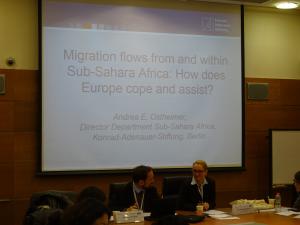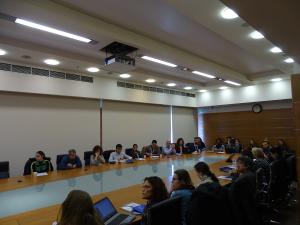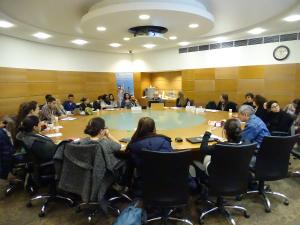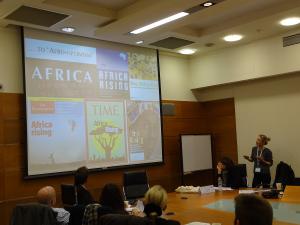The conference was opened by Prof. Sharon Pardo, the Chair of the National Jean Monnet Centre of Excellence – the Centre for the Study of European Politics and Society (CSEPS), and Dr. Michael Borchard Head of the Konrad-Adenauer-Stiftung office in Israel. Both welcomed the participants and introduced the topic, while stressing its importance. Prof. Sharon Pardo drew attention to the significantly increasing immigration from Africa and the thereby rising humanitarian crisis in the Mediterranean Sea. Ad-dressing the attempt of Western countries to reduce immigration, he explained the importance to provide decision makers with in-depth information. Dr. Michael Borchard further addressed the relations between Europe and Africa and explained the urgency of this issue and the way it's being handled by European decision makers nowadays. He explained that migration holds policy challenges as well as opportunities. Then, he introduced the Keynote speakers Andrea Ostheimer and Dr. Marie Rodet and spanned a bridge to the first contribution by mentioning the shared history of Europe and Africa.
Keynote Speeches
Dr. Marie Rodet, SOAS (University of London): (Re) thinking African Migration from and Inter-sectional Perspective.
In her lecture, Dr. Marie Rodet proposed to ‘(re)think African Migration from an Inter-sectional Perspective’. First, she outlined the way in which both areas of study connect with each other in order to provide a multidisciplinary perspective. Then she highlighted that most of the African migration takes place in the continent itself and stated that this fact is often overlooked. Furthermore, she criticized the lack of conversation between the two schools and the poor research work from the African perspective. Dr. Rodet explained the value of analyzing different processes of migration in African history for under-standing its complex nature. Moreover, she pointed out that the mainly discussed illegal economic mi-grant makes other actors of migration invisible. She called upon the importance of understanding all actors of migration in order to avoid a homogeneous perspective of African migration. This historical and inter-sectional analysis, Dr. Rodet concluded, would contribute to the analyzing the whole network be-tween region of origin and region of migration.
After her speech, Dr. Rodet had the chance to address several questions. One of the more important questions that were brought up was about whether African communities think different about migrants then European societies. Dr. Rodet explained that definitions regarding migrants and migration vary from place to place and change over time. Due to this fluidity, there are also differences between Africa and Europe in defining these terms.
Mrs. Andrea E. Ostheimer (Head of Department for Sub-Saharan Africa, Konrad-Adenauer-Stiftung): Migration Flows from and within Sub-Saharan Africa. How Does Europe Cope and Assist?
Mrs. Ostheimer opened her presentation with some background information about the relations be-tween Africa and Europe. She went on and explained preconditions and trends of migration from Africa as well as push and pull factors. She pointed out that from an African perspective migration is consider-ate as opportunity issue, while in Europe it is seen as security issue. Consequently, she explained, the EU aims to establish a stable and safe migration policy. It seeks to provide regulation of migration through addressing migration causes in the countries of origin. However, African politicians in most cases do not want to take responsibility the current level of development. Moreover, many regions inside Africa are destabilized due to the refugee flow, which is a burden on local communities.
Following the speech, Mrs. Ostheimer was asked several questions regarding her experience in Africa. One the most interesting questions regarded the impact of mega foundations on the African well-being. Mrs. Ostheimer accordingly explained the problems related to projects there. The establishment of projects takes a long time and they often depend on the African country’s political will. Furthermore, the project’s approach seems often problematic with regard to continuation after the project’s end. Finally, she emphasized that in order to improve the migration process, the relation and interaction be-tween Europe and Africa needs to be improved on the political level.
Parallel Paper Panels
In each of the panels during the conference, each of the participants had 10-15 minutes to present his research. Finally, after everyone has presented their research, the other participants and the chair had the chance to make comments and ask questions. You can see the full list of speakers and panels in the conference program. Here is a small taste of just a few of the fascinating studies that were presented during the conference.
Immigrants and Host Countries.
Chair: Dr. Marie Rodet, SOAS (University of London)
Uri Rosenberg (Tel-Aviv University): Geopolitical Injustices, the Illness of Western Culture, and Maintaining a Muslim Identity in Germany –Millî Görüş Writing on “the West” for Turks in Germany in the 80’s.
The study asked to recreate and comprehend the image of the West, as it was presented by the group Millî Görüş in the 1980s. The study was based on an analysis of the Newspaper Milli Gazete, which ad-dressed Turkish migrants in Germany. According to Mr. Rosenberg, Millî Görüş’s aim was to change the Ataturk vision and to make Turkey more religious. He explained that the newspaper presented Muslim "victim-hood" – how Muslims were under attack by non-Muslims– and conspiracies characterized as “anti-Semitic pacifism” blaming Jews for every conflict. The newspaper promoted unity and support among Muslims, Islamism of Muslim states and the politicization of Muslim minorities. It opposed the idea of assimilation of the Turkish immigrants in Germany. Furthermore, it described at the same time the growing interest of Western societies in Islam.
Mrs. Marlous Von Waijenburg (Northwestern University): Is Africa Growing out of Poverty? How Comparative History Can Enrich Contemporary Development Debates
In her contribution, Mrs. Von Waijenburg stated that historians are still remarkably absent from the “poverty debate” and that there is a disciplinary detachment of economics and history. She explained that Sub-Saharan Africa’s recent economic boom has raised hopes to close the income gap with the rest of the world in the decades to come, and to lift its ‘bottom millions’ structurally out of poverty. In her paper, she evaluated the continent’s current growth wave from a long-term comparative perspective, drawing attention to relevant differences and analogies in the historical growth experiences of Ghana, Japan and Britain – 3 front-runners of region-specific growth paths – since 1750. She illustrated how the time-horizons that dominated ongoing development debates remained too short to identify some of the deeper changes that are taking place in African economies.
Politics, Community, Health
Chair: Dr. Anat Rosental, Ben-Gurion University of the Negev
Mr. Einav Levy (Vrije Universiteit Brussels): On Their Way- Medical and Communal Aspects of Migration from the Middle East and Afghanistan – Case Study from a Transit Camp in Serbia.
Mr. Levy presented the importance of the research by stating that its goal is to give a tool for decision makers on how to plan in advance the optimal measures and means regarding medicines, cross cultural issues, resources and expertise. The temporary camps, where the refugees in Europe stay are in very bad conditions in terms of sanitary, health, ability to supply food etc. Mr. Levy presented the example of the Presvo transit camp in Serbia and the tough conditions there. The clinic in the camp was very basic – far from being a hospital, but the refugees usually did not want to go to hospitals, even in extreme situations, because they preferred to go forward, to EU countries, afraid that their relatives will keep on moving, leaving them behind. The research dealt with understanding and analyzing the origin – gender – age and health condition, by examining a sample of refugees. The conclusions of the research were that diagnoses and treatments were influenced by the constant need to move, cultural and gender related issues and the lack of resources. He stressed that it is crucial to remember that it is the obligation of host societies organizations and institutions to help refugees to have optimal conditions to live in, while they are on the move.
Ms. Rivka Leff, (Ben-Gurion University of the Negev): Models for Community Health workers in the Care of Repatriated Refugees in Rural Burundi.
This research looked into the question of what happens with refugees few years after they leave their place of origin and become refugees. The research deals with the process of repatriation of refugees in Burundi. The instability of Burundi that led to periodic massive waves of refugees, as well to a process of repatriation some years later. Ms. Leff looked into the medical conditions, comparing it to the political condition of the refugees, based on the disease map data, considering that the system of the country and the NGOs do not know how to understand the health of the returnee's, and don't reach to all needed areas. The research showed the important role of the community health workers, which do more than just taking care over the sick. While taking care of the health and hygiene, they also advise people, helping them to overcome various social difficulties. The Community health workers are playing a major role on the situation in Burundi - they help with gaps of knowledge and gap of connection be-tween the refugees and the returnees to the authorities. The presentation concluded that people's needs are different; every crisis the world is different. It is necessary to consider what is the best treatment for each situation and how and what can really help the people that are in need.
Constructing Identity in Urban Spaces
Chair: Prof. Ruth Ginio, Ben-Gurion University of the Negev
Ms. Ashira Meanshe-Oren (The Hebrew University of Jerusalem): Social Conflict and the Urban Youth Bulge in Sub-Saharan Africa.
Ms. Menashe-Oren explained that Sub-Saharan Africa (SSA) is the region of the world with the greatest expected future population growth and where urbanization is expected to increase the most in the coming decades. This has raised legitimate concerns about the potential role of large cohorts of young men contributing to social unrest and conflict. Prior work has ignored the distinction between youth bulges arising from natural increase and growth, which is a product of rural-to-urban migration. This re-search used a novel approach to distinguish these factors in SSA between 1990 and 2014 and to examine the specific effects of a migrant youth bulge on the likelihood of social conflict in SSA. Empirical analysis suggests that a migrant youth bulge leads to reduced risk and frequency of urban social conflict, specifically demonstrations, riots and strikes. This suggests that for migrants from the rural sector the benefits of living in the urban sector surpass the disadvantages.
Mr. Adam Rotbard, (Ben Gurion University): Here We Play, Not Cry - Eritrean Lament Ceremonies in South Tel-Aviv's Public Space as a Space of Struggle and Identity Formation.
The research focused on the parks of south Tel-Aviv and the conflict between the Israelis who live in the area and the Eritrean migrant community. Many Israeli Jews protested against the ceremonies the Eritreans conducted. The Israelis interrupted the ceremonies and the police had to intervene to prevent violence. A Facebook campaign against the ceremonies started and invited Israelis for the protests. Some came to protest against and some came to protest for the freedom of the Eritreans. The protests succeeded and the events were limited to only several areas. The research tried to understand different aspects of the protests and the ceremonies, such as the people who participated in the ceremonies (mostly men), where did they come from in Eritrea and more. The method focused on formal and in-formal conversations, interviews, etc.
Concluding Remarks
Prof. Lynn Schler from the Africa center at the Ben-Gurion University of the Negev concluded the conference by saying that it was a very exciting forum for discussions and allowed everyone to present their research in a friendly environment. Prof. Schler explained how important it was to bring up the different aspects of migration and mobility that were discussed extensively throughout the day. Finally, she said that goal of this annual conference is to support and create the next generation of researchers in Israel and after attending the panels, she believes that there were many reasons to be hopeful in this regard.






